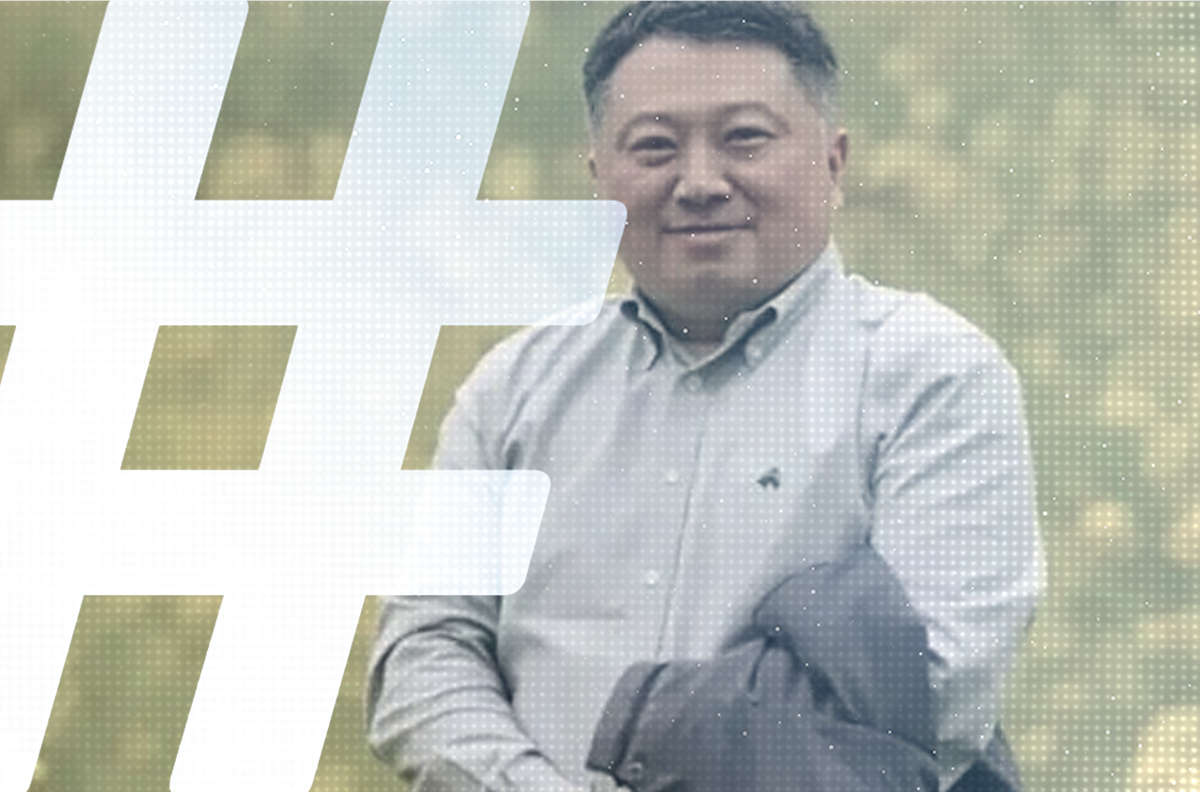The propaganda stunt pulled today by soldiers from the Kowloon barracks of the Chinese army could be read in many ways, and speculation is now running free across Hong Kong. But in very clear ways, the action underscores the deep divide that separates political cultures and consciousness in China and Hong Kong.
For some, the brief publicity campaign, in which People’s Liberation Army soldiers clad in olive green t-shirts and orange basketball jerseys jogged out from the barracks in triple-file to clear away barricades and bricks left by protesters in the vicinity of Hong Kong Baptist University, is an ominous sign that China wants to normalize the public image of the PLA taking a more active role in public order in the city.
A Twitter post from Demosistō, the political party founded by activist Joshua Wong, called the action a “salami tactic” used by China to “intervene in [Hong Kong] affairs more directly.” Others interpreted it as a warning message — a reminder that if the unrest continues, the gates of the Chinese garrison can swing right open.
Although the PLA must not, according to Hong Kong’s Basic Law and the Garrison Law, interfere in local affairs, its troops may be called upon to assist with disaster relief or maintain public order upon request by the SAR government. No request for assistance with public order has ever been made since Hong Kong’s return to Chinese rule in 1997. Democratic Party lawmaker James To Kun-sun told the SCMP, however, that today’s action did not appear to be voluntary service, as when the PLA took part last year in the planting of trees felled during Typhoon Mangkhut. “It’s more like assisting the maintenance of public order,” he said.
But aside from the question of what this propaganda stunt means in the context of events in Hong Kong, the action is a clear illustration of the political culture that prevails across the border — and its sharply different conception of the role of the media.
Camera Shy
One video of today’s stunt includes several scenes with the garrison’s own soldier-cameraman. Watch the opening frame and you’ll see him, the only one wearing camouflage fatigues, hustling alongside the column of soldiers.
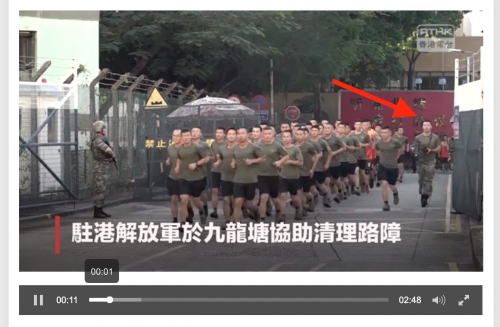
As the soldiers turn the corner onto the street, they are greeted by a small group of onlookers who shout and applaud, but the scene seems awkward and contrived, and the applause immediately subsides.
In a subsequent frame, the soldier with the camera again moves across the lens as the soldiers are standing at attention.
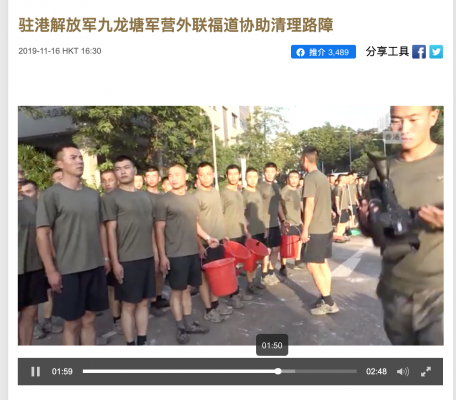
When the column returns to the garrison, and as the gates are closing, the cameraman in fatigues is the last to enter. He has captured the scenes, we can assume, that will now spread across the Chinese internet — telling a story of duty, obedience and restoration of order.
But in Hong Kong, where freedom of the press and publication are enshrined in Article 27 of the Basic Law, constructing and maintaining such a narrative is not such a simple matter as it might be inside China.
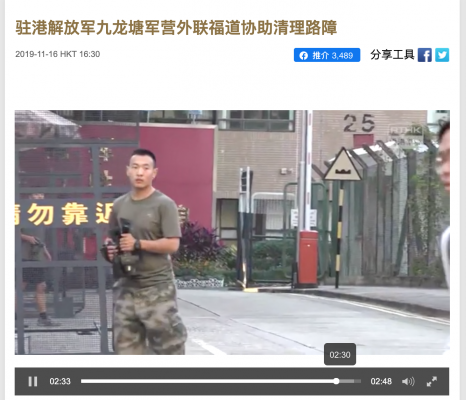
In a separate video shared by RTHK, a member of the PLA group who appears to be an officer from the garrison is confronted by journalists and ordinary Hong Kong residents about the reason for the action and the poor message it might send to the city.
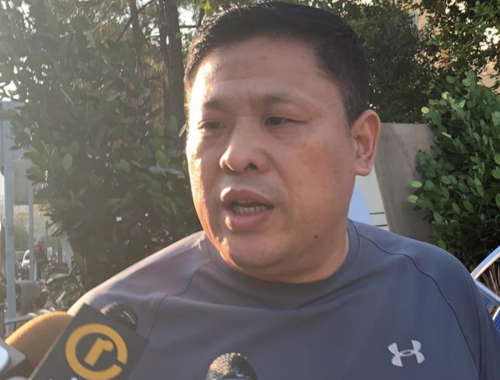
“We are spreading positive energy!” he shouts at the outset of the video, parroting a phrase straight from Xi Jinping’s information control lexicon, meaning to emphasize positive messages over critical ones.
To this an off-camera voice responds, deepening the sense of divide and dissonance: “What does that mean, positive energy?”
“I’m not doing interviews!” he says sternly as he turns, clearly growing upset. He walks around as the cameras and microphones trail him closely. Can he sense, perhaps, the narrative unwinding? He is out of his element entirely, a relic transported into the future. His strapping soldiers are busy clearing away the street, presenting the kind of ready image one might expect to find on the front page of the Liberation Army Daily. And yet the cameras have turned on him. He has become the story.
Next, a reporter asks the question that will soon be on the minds of many people in Hong Kong: “Aren’t you concerned that this will give the Hong Kong people a bad impression?” Another voice shouts: “Won’t this just cause further disputes?”
He turns, first with a look of incomprehension, then quickly spinning back into irritation. He points toward the garrison gate, to where his soldiers were greeted with the spattering of unconvincing applause: “The applause of the Hong Kong people, that is the best impression!” he growls. “What else is there to ask? Bad impressions? No more questions!”
Now completely surrounded as he walks about, he searches desperately for an escape. “Who are you?” someone then asks.
“I am the Hong Kong Garrison of the People’s Liberation Army!”
“But who are you?” “Are you the commander?” “What is your surname?”
“No more questions!”
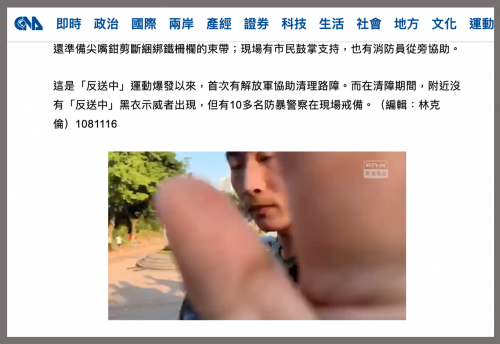
The scene reveals all. Though he has already claimed that the actions of the soldiers are “spontaneous,” a matter of individual will — zifa (自发) is the word his uses — he is unwilling, and almost certainly unable, to name himself.
He is the Hong Kong Garrison of the PLA, and the PLA is commanded by the Chinese Communist Party, and individual wills and identities do not enter into the world so structured. By the same token, the only “impression” to be made is that of the goodness and positivity of the PLA and of the Party, a story that all are duty-bound to accept.
The failure of the journalists to simply accept the officer’s de-personalized language of power is something he doesn’t seem to have foreseen. In this context, he cannot deal with even the most basic question of humanity and personal responsibility: “Who are you?”
His de-personalization and subjugation mirrors that of China’s news media, and the role of the journalist as a purveyor of “positive energy.” Consider, in light of the officer’s inability to offer even his surname, how Xi Jinping doubled-down on press controls in 2016 by stressing to all media that they are “surnamed Party.”
This clean-up drive was not just the perfect allegory for the relationship between the individual, power and the media in China — it was its exemplification, right on the streets of Hong Kong.
Finally, the scene grows desperate, and two unidentified women appear to try to extract the officer from his predicament. Meanwhile, the cameraman in fatigues appears once again, raising a hand to block one of the now unwelcome cameras with his hand. The documenter turns to physical obstruction. But this does not mean that the nature of his work has changed — not at all. He must obstruct this complicating narrative on the street as much as he seeks to advance the Party’s narrative.
Just as positivity demands the suppression of gloom, so does propaganda, the expression of power, entail the obstruction of truth. It cannot live with questions.

